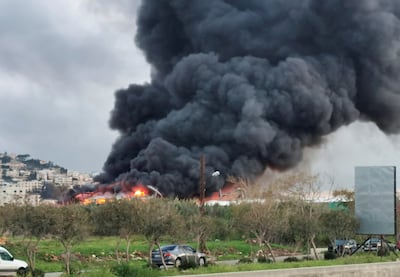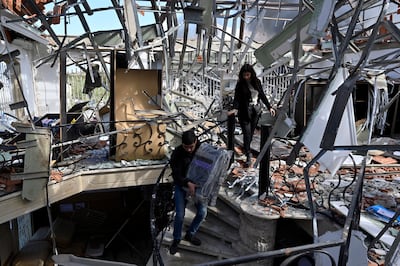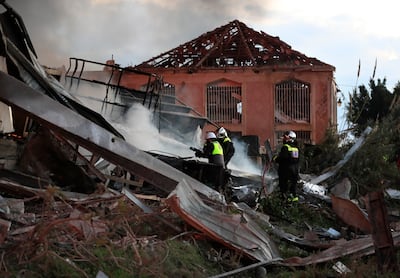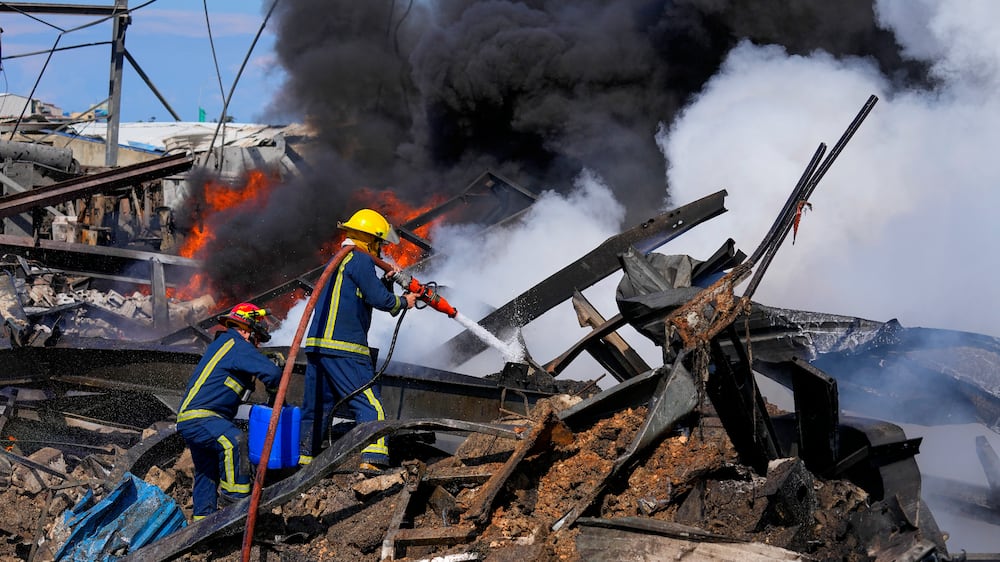Live updates: Follow the latest news on Israel-Gaza
Thick smoke continued to billow on Tuesday from a destroyed building in Ghazieh, south Lebanon, where Israeli strikes sent a fireball soaring into the air late on Monday.
The warehouse's structure was charred, mangled and still on fire hours after the strike, while at its centre sat a deep crater, as motor oil leaked down a muddy hill.
The attack marked an escalation in the conflict between the Lebanese armed group Hezbollah and Israeli forces, who have been engaged in near-daily cross-border exchanges of fire since October 8.
The Israeli strikes on Ghazieh, on the outskirts of the city of Saida – around 60km from the border, were the third deepest into Lebanese territory since the fighting started.
Israel said it was targeting a Hezbollah arms depot in response to a drone attack on its territory, but residents and a Lebanese security official denied the claim.
A local official said the building contained generators and motor oil, in an area home to factories and industrial warehouses.
“This is terrorism. You can see it's a compound that's been here for 11 years. Everybody can go in and out. Everybody can see what's inside,” Hassan Ghadar, the mayor of Ghazieh, told The National from the burning compound.
“When you talk about terrorism, this is terrorism. This is the destruction of people's businesses. This is terrorism, it is as simple as that,” he added.

The building's owners say the damage will run into the millions of dollars.
Mohammed Khalifa said the area is “open for all people, every day people come here and see there is nothing”.
“It's not a closed place. You have a lot of people working here. Nobody can tell you another story,” added Youssef Khalifa, Mohammed's cousin.

The conflict in south Lebanon, which comes within the context of Israel's war with Hamas in Gaza, has seen the worst fighting between Hezbollah and Israel since their brutal month-long war in 2006.
More than 200 people have been killed in Lebanon, most of them Hezbollah fighters. The conflict has gradually increased in intensity, with strikes outside the normal fighting zone.
In January, Israel assassinated Hamas deputy Saleh Al Arouri in a Beirut suburb, the first time it had attacked the Lebanese capital since 2006.
Earlier this month, Israel struck a car in Jadra, north of Saida, in an apparent attempt to assassinate a Hamas official that instead killed a Hezbollah member and at least one civilian.
Last week, two sets of Israeli strikes on southern Lebanon killed 10 civilians and several Hezbollah fighters, including a commander in the group's elite Radwan force.
Youssef Khalifa said there is concern in the area of Monday's strike that the conflict is spreading from the border up to Saida and surrounding areas.
“Israel has no limits, we know that,” he added.
Hezbollah Secretary General Hassan Nasrallah recently warned there would be reprisals and said Israel would pay “in blood” for the killings of civilians.
A source close to Hezbollah in Beirut said the Iran-backed group “cannot accept a change in the rules of engagement by the Israelis”.
“Israel's escalation of its targeting of Lebanese civilians aims to pressure Hezbollah to stop supporting Gaza,” added the source.

The exchanges between Hezbollah and Israel have typically been contained within so-called, informal rules of engagement, or essentially carefully calculated attacks that attempt to alleviate the conflict spiralling.
But with the death of civilians in Lebanon, and Hezbollah increasing the scope of its attacks, there are signs the restraints on the fighting are unravelling.
Israel has also repeatedly threatened to escalate the war, with its Foreign Minister Israel Katz saying Lebanon would “pay a heavy price” if diplomatic means failed to remove Hezbollah from the border zone.
Hezbollah says it is carrying out attacks on its arch-enemy Israel in support of its ally Hamas in the Gaza Strip. On October 7, Hamas launched an unprecedented and deadly incursion into southern Israel. In response, more than 29,000 Palestinians have been killed in Israel's relentless bombardment of the besieged enclave.
An informed Lebanese security source told The National that the strike in Ghazieh “is a message from Israel that it is ready to cross red lines wherever it wants, including Beirut itself”.
“There is no truth to the Israeli claims that the targeted sites in Ghazieh have weapon storage. It is completely false,” he added, suggesting that the attack was instead aimed at provoking Hezbollah into escalation.
“Israel is trying to corner Hezbollah to push it to make a strong reaction. This is an attempt to lure the party after it began to appear that the Israelis had imposed some kind of field control in Gaza, which allowed them to reduce their weight in southern Israel and focus on the situation in the north with Lebanon.”






